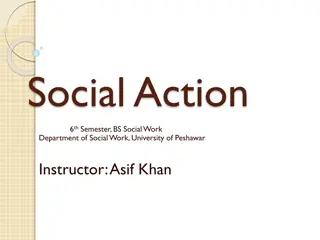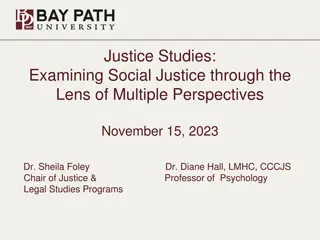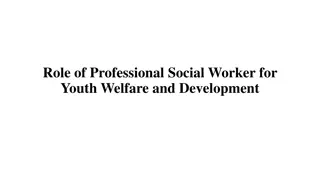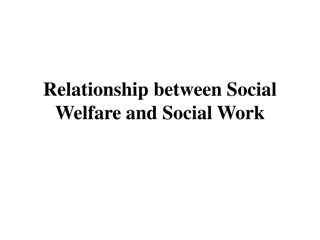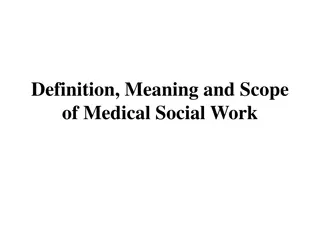The Vital Role of Social Workers in Promoting Justice and Well-being
Social work is a profession dedicated to helping individuals and communities overcome social challenges, advocating for justice, protecting vulnerable individuals, and enhancing community well-being. Social workers play a crucial role in promoting social justice, human rights, and overall community stability by providing support, advocacy, and resources to those in need.
Download Presentation

Please find below an Image/Link to download the presentation.
The content on the website is provided AS IS for your information and personal use only. It may not be sold, licensed, or shared on other websites without obtaining consent from the author. Download presentation by click this link. If you encounter any issues during the download, it is possible that the publisher has removed the file from their server.
E N D
Presentation Transcript
background Social work is a profession dedicated to helping individuals and communities overcome social challenges. The profession bring hope for our most vulnerable citizens. It's the profession dedicated to transforming lives, healing communities, and creating a more just and compassionate society. It's time we recognize and support the tireless efforts of social workers in shaping a better future for all." a qualified social worker, one typically needs a bachelor's or master's degree in social work. According to Friedlander (1951 ) social work is a professional service based on scientific knowledge and skill in human relations , which assists individuals ,alone or in groups, to obtain social and personal satisfaction and independence. In the field of social work, students often complement their studies with subjects like Psychology, Criminology, and Sociology, among others. These disciplines provide valuable skills for working effectively in a wide range of diverse settings.
Rationale behind the unemployed social work movement: In 2006, the former Minister of Social Development, Zola Skweyiya, highlighted a significant shortage of skilled social workers in South Africa, officially labelling it as a scarce skill. He encouraged young people to consider pursuing social work studies after completing their matric, in July 2003, Minister Lindiwe Zulu acknowledged the shortage of social workers in South Africa. Despite the severe shortage, the Department of Social Development failed to fill over 9,000 vacant positions for qualified social workers. Around July 17, 2019, Minister Zulu committed to addressing the issue of unemployed social workers. During the presentation of the Department's Annual Performance Plan to the Select Committee on Health and Social Development in Parliament, concerns were raised about the unemployment of social workers nationwide. Minister Zulu emphasized her commitment to tackling this issue through collaboration between the government and the private sector. In March of that year, the Department of Social Development invited all unemployed social workers to register on its database to gain insights into the number of unemployed social work graduates who did not benefit from the Social Development scholarship program. This registration aimed to facilitate more effective planning and broader inclusion of social work graduates in government recruitment processes. During the Committee meeting, it was revealed that 7,000 unemployed social workers had registered on the departmental database, excluding the 5,000 who had studied through the Social Development Scholarship program. Notably, the social work profession was declared a critical skill in South Africa in 2001
ROLE OF SOCIAL WORK: Social workers play a crucial role in society by providing support, advocacy and resources to individuals, families, groups and communities facing various challenges. Their work is essentially for promoting social justice, human rights and overall well-being and here are some key reason why social workers are important: 1. Enhancing individual and community well-being: Social worker will work directly with individuals and families to address their emotions, social, and economic need. They provide counselling, guidance and support to help people to overcome their personal challenges such as mental health issues, addiction, and domestic violence and so on. Social workers contribute to the overall health and stability of the community 2. Advocate for justice: Social workers are advocating for justice and equality. They identify and challenge systematic injustices and discrimination that affects vulnerable population, by raising awareness, promoting policies and lobbying for change. Social Workers strive to create more equitable society. 3. Protecting children and vulnerable individual: Social workers often work in child protection agencies, Insuring the safety and well-being of the children who are at risk Negligence or Exploitation. They assess family situations, provide Support,intervention,and makes recommendation for safeguard of the best interest of the child. Social workers also play an important roles on protecting other vulnerable Population such as elderly, individuals with disabilities and others.
Impact of Unemployment Among Graduates Untapped Skilled Workforce: Unemployed graduate social workers represent a highly skilled and well- educated workforce that remains underutilized. This represents a substantial loss of human capital, given the extensive training and education these individuals have undergone. Erosion of Social Services: South Africa grapples with numerous social challenges, including poverty, inequality, and healthcare disparities. The unemployment of social workers directly contributes to the deterioration of essential social services like child protection, mental health support, and community development, adversely affecting the most vulnerable members of society. Growing Dependency on Social Welfare: A scarcity of employed social workers places greater strain on the social welfare system as more citizens may require government assistance due to unmet social service needs. This, in turn, places additional pressure on public resources and budgets. Missed Opportunities for National Development: The National Development Plan (NDP) in South Africa aspires to alleviate poverty, reduce inequality, and foster sustainable development. Graduate unemployment in the social work sector contradicts the goals of the NDP, impeding the country's progress toward these objectives. Economic Implications: Graduate unemployment results in a loss of income and purchasing power for individuals who could otherwise contribute to the economy. It also hampers economic growth and development as these individuals struggle to secure sustainable employment. Social Unrest and Dissatisfaction: Prolonged graduate unemployment can give rise to social unrest and discontent. The frustration experienced by educated youth unable to find work can lead to protests and social instability, negatively impacting the overall well-being of the nation. Brain Drain: In certain cases, unemployed graduate social workers may seek job opportunities in other countries, leading to a "brain drain." This phenomenon results in South Africa losing skilled professionals to foreign nations, affecting its human capital and expertise.
Mitigating Factors and Recommendations: Government Collaboration and Investment: Encourage collaboration between the South African government and relevant stakeholders, such as social work institutions and organizations, to invest in the expansion of social services. This investment should be aimed at creating more job opportunities for social workers. Review and Reform Policies: Parliament should review and reform policies related to the employment of social workers. This could include streamlining and expediting the accreditation and licensing process for social workers, making it easier for them to enter the workforce. Targeted Job Creation Programs: Develop targeted job creation programs specifically for social workers. These programs can be part of broader community development initiatives, focusing on areas with the highest need for social services. Mentorship and Training Initiatives: Establish mentorship and training programs that pair newly qualified social workers with experienced professionals. This not only helps with job readiness but also encourages the hiring of newly qualified social workers. Public-Private Partnerships: Encourage public-private partnerships to support social work employment. Private organizations can collaborate with the government to fund and establish social service projects that require social worker involvement. Expand the Role of Social Workers: Look into expanding the role of social workers in different sectors, including education, healthcare, and justice. Creating opportunities for social workers in non-traditional settings can alleviate unemployment. Retain Social Workers in Rural Areas: Implement strategies to retain social workers in rural and underserved areas by offering incentives, such as student loan forgiveness, housing assistance, and increased pay in these regions.
Continual Data Collection: Parliament should encourage the collection and analysis of data on social work graduate employment and the demand for social services. This data can inform policy decisions and workforce planning. Increase Funding for NGO's: Allocate more funding to NGOs that employ social workers, as these organizations play a vital role in delivering social services.
LEGAL AND FRAMEWORK It legally required that all social workers regardless of whether employed or not must be registered with SACSSP and their annually fee be paid in full, failure to comply with such, renders one ineligible to practice nor apply for a particular job which requires the registration with SACSSP. In light of the above, it will be unethical to practice without complying with the above. As such unemployment within the Social Services profession subjects unemployed graduates to a position of disregarding the legal and ethical requirements of the profession by continuing to apply for jobs regardless of unpaid annual fees, as a result risking being subjected to disciplinary hearings by SACSSP. It is important to note that adherence to the ethical and legal obligations in the profession remains two elements of importance in the profession, therefore new legal obligations or legal rules must be drafted to protect the unemployed social workers or unemployed social science professionals. Furthermore, legal rules that will permit without any hindrance the unemployed social sciences professionals to secure jobs first and update their annual fees once they are employed considering the current economic climate of the country. Consequently efforts must be made in collaborations with other departments to secure employment for such professionals. It vital to note that in a country like South Africa which is burdened by many social ills and socially undeveloped communities there will always be a need of social services professionals. Lastly, legal rules pertaining to working in foreign countries must be relaxed so that those who deem the need to practice in a foreign country can do so without any hurdles.
Conclusion: In conclusion, the issue of unemployment among social workers in South Africa is a pressing concern with far-reaching implications. It not only results in the underutilization of a highly skilled workforce but also compromises the delivery of essential social services, exacerbating the challenges faced by the most vulnerable members of our society. Our goal, through this presentation, is to shed light on this critical issue and urge Parliament to take meaningful action. We call upon our lawmakers to recognize the profound importance of social workers and the transformative impact together, we have the power to transform this challenge into an opportunity, unlocking the potential of a skilled workforce and ensuring the well-being and prosperity of our nation. Let us take this call to action and make a tangible difference in the lives of both social workers and the communities they serve. It's time to make South Africa's social work sector a pillar of strength, contributing to a more just, equitable, and thriving society. Tau Tsa Hloka Seboka di sitwa ke Nare e Hlotsa







